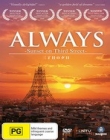Always Sunset on Third Street (Always san-chôme no yûhi) (2005) |
|
Always Sunset on Third Street (Always san-chôme no yûhi) (2005) |
|


|
| BUY IT |
| General | Extras | ||
| Category | Drama | Theatrical Trailer | |
| Rating |

|
||
| Year Of Production | 2005 | ||
| Running Time | 133:00 | ||
| RSDL / Flipper | Dual Layered | Cast & Crew | |
| Start Up | Menu | ||
| Region Coding | 4 | Directed By | Takashi Yamazaki |
|
Studio
Distributor |
 Madman Entertainment |
Starring |
Maki Horikita Hidetaka Yoshioka Shin'ichi Tsutsumi Koyuki Hiroko Yakushimaru Kazuki Koshimizu Kenta Suga Masaya Takahashi Kaga Mochimaru Toru Masuoka Takashi Matsuo Hiroshi Kamido |
| Case | Amaray-Transparent | ||
| RPI | ? | Music | Naoki Sato |
| Video | Audio | ||
| Pan & Scan/Full Frame | None |
Japanese Dolby Digital 5.1 (448Kb/s) Japanese Dolby Digital 2.0 (224Kb/s) |
|
| Widescreen Aspect Ratio | 2.35:1 | ||
| 16x9 Enhancement |
 |
||
| Video Format | 576i (PAL) | ||
| Original Aspect Ratio | 2.35:1 | Miscellaneous | |
| Jacket Pictures | No | ||
| Subtitles | English | Smoking | No |
| Annoying Product Placement | No | ||
| Action In or After Credits | No | ||
Always Sunset on Third Street (Always San-Chome no Yuhi) is a 2005 Japanese film, apparently based on a popular Manga serial of the same name. It has taken 3 years to get a DVD released in Australia despite the fact that it was immensely popular in its native Japan. Not only was the film a success at the box office but it won an amazing 12 awards at the 2006 Japanese Academy Awards, winning in just about every category.
The popularity and critical success is perhaps no surprise. Always Sunset is a sentimental look back at post-war Japan when the economic boom of the electronics age was just coming into effect. The film is set in 1958 and the constant reminder of progress is the construction of the Tokyo Tower, which goes from a mere base to a soaring achievement within the course of this 2 hour movie. Most people would know the tower by its similarity to the Parisian Eiffel Tower but perhaps even more would know it from the beating it usually sustained at the hands of a string of Japanese giant monsters in the B films of the 50's and 60's.
Always Sunset is a slice of life film focusing on the working class inhabitants of suburban Tokyo.
Norifumi Suzuki (Shin'ichi Tsutsumi) and his wife Tomoe (Hiroko Yakushimaru) run a small auto repair shop. The shop is proudly named Suzuki Auto's, a reflection of Norifumi's aspirations. They live with their son Ippei(Kazuki Koshimizu). Into their life comes Mutsuko Hosino (Maki Horikita), a young girl from rural Japan. As she arrives with her friends in the big city she can't help but to feel a little smugness - after all, she is about to commence work for the mighty Suzuki Auto's Corporation!
Of course, she faces a huge let down when she sees the humble auto repair shop. The quick tempered Norifumi isn't happy either - he seems to recall that Mutsuko's reference stated that she was an expert at auto mobile repairs when she can't even recognise basic components.
Down the street lives Ryunosuke Chagawa (Hidetaka Yoshioka), a serious writer with a serious case of writers block. He too has aspirations of greatness; however his only skill seems to be writing stories for boy's adventure books. He has a crush on a local bar owner, Hiromi Ishizaki (Koyuki), who has a soft spot for him too. Using her feminine wiles she pawns off a young boy Junnosuke (Kenta Suga)on him, the illegitimate son of a friend who is a "hostess" from another part of town.
After a few drinks and a nod and a wink from Hiromi, Junnosuke goes to live with Chagawa. The writer is resentful of having been tricked and treats Junnosuke coldly until one day when he finds out that Junnosuke is a huge fan of his adventure stories. Another key character is the local doctor who lost his family during the war and has lived a semi existence since then.
Throughout the story each of these characters is tested. As said, this is a slice of life film and relies heavily on sentimentality and melodrama. This is not a bad thing as the highly adaptive quality of the acting and the overall production values are such that it is difficult to resist being swept up into these lives. The film is full of small moments of nostalgia and wonderment, such as when the Suzuki household get a television set. The locals gather to watch fight night as though it is a religious experience.
There is a glow cast over the film and comparisons come to mind with Woody Allen's Radio Days. To call the film heart-warming perhaps does it a disservice. Always Sunset is an enjoyable film which, dare I say, the whole family can enjoy (as long as they can read subtitles) and contains some really endearing scenes.
Always Sunset was presented cinematically at a 2.35:1 aspect ratio. This ratio has been preserved for the DVD release.
The title is described as being 16x9 enhanced.
It is difficult to know whether the general softness of the picture is a reflection of the transfer or a deliberate decision on the part of the director and cinematographer to remind us that we are in Japan of the late 1950's. Whatever the reason this transfer does display little sharpness.
There is digital noise to be seen at times particularly in the post production work on the skies.
The print itself is in fine condition with no artefacts or damage of any kind. The colours are stable.
The sub-titles are in yellow and are easy to read.
| Sharpness | |
| Shadow Detail | |
| Colour | |
| Grain/Pixelization | |
| Film-To-Video Artefacts | |
| Film Artefacts | |
| Overall |
The sound for Always Sunset is Japanese Dolby Digital 5.1 running at 448kp/s. There is also a Dolby Digital Japanese 2.0 track.
The sound is very upfront and, if anything, is sometimes a little too aggressive. That wouldn't worry action film fans but I suspect that's not the target audience for this particular movie.
The sub-woofer engaged frequently with the swell of music and I could detect a little background noise in some of the quieter patches.
The music itself is by composer Naoki Sato. It is a full-on Hollywood-style score with symphonic elements including swelling strings contrasted with delicate solo instruments. It is in keeping with the nostalgic nature of the film although some may find it a little too sweet.
Otherwise the sound appears fine and the characters appear to be speaking in audio sync.
| Dialogue | |
| Audio Sync | |
| Clicks/Pops/Dropouts | |
| Surround Channel Use | |
| Subwoofer | |
| Overall |
NOTE: To view non-R4 releases, your equipment needs to be multi-zone compatible and usually also NTSC compatible.
The film has been released in Japan on DVD and in Region 2. This is a PAL transfer although the Region 2 is apparently an NTSC release. Apparently there is an audio commentary on the Japanese release but I cannot determine whether it is subtitled.
Always Sunset is a good movie which, no doubt, holds a special place in the hearts of many Japanese people. Western audiences will still find much to enjoy.
I had hoped for a transfer that was a little more crisp but it may be that the film looks this way for directorial reasons. The soundtrack is assertive and you may need to turn your standard volume settings down a notch.
| Video | |
| Audio | |
| Extras | |
| Plot | |
| Overall |
| Review Equipment | |
| DVD | Pioneer BDP-LX70A Blu-ray Player, using HDMI output |
| Display | Pioneer PDP-5000EX. This display device has not been calibrated. This display device is 16x9 capable. This display device has a maximum native resolution of 1080p. |
| Audio Decoder | Built in to amplifier/receiver. Calibrated with Ultimate DVD Platinum. |
| Amplification | Onkyo TX-SR605 |
| Speakers | JBL 5.1 Surround and Subwoofer |